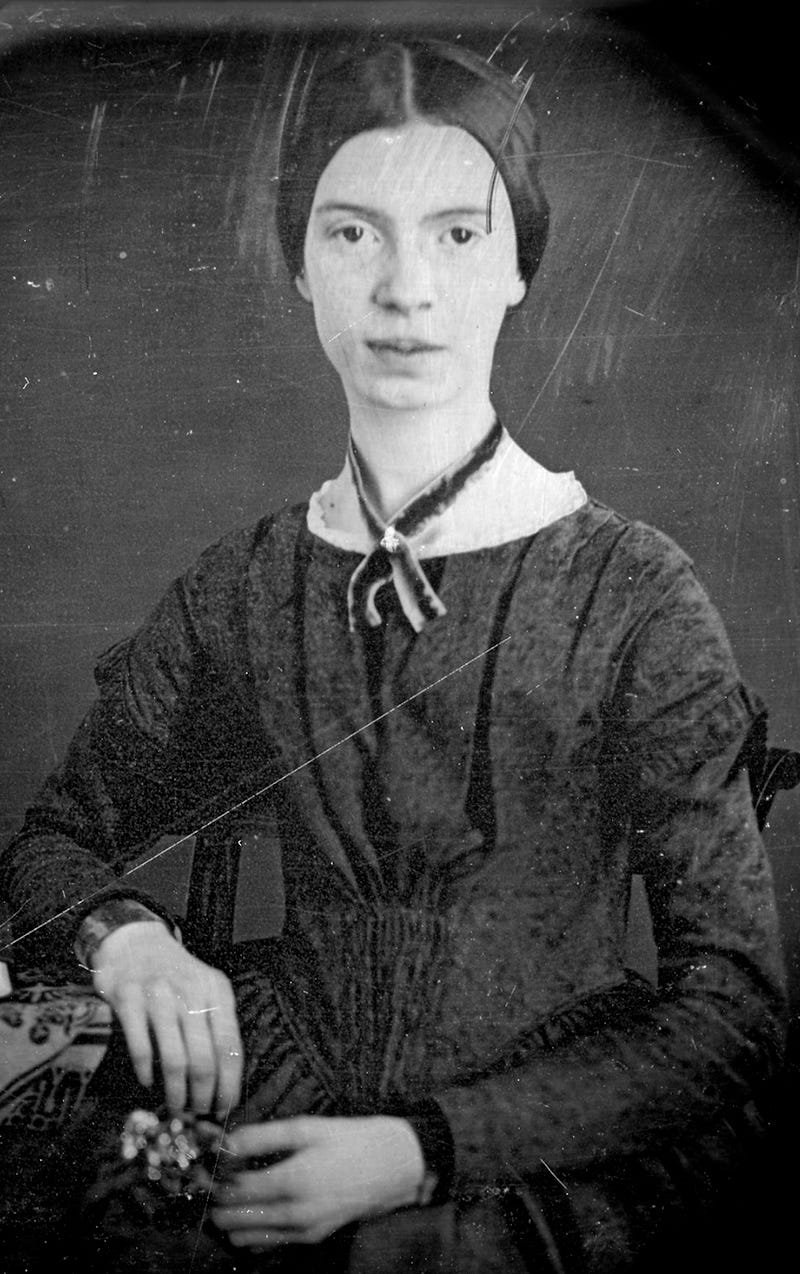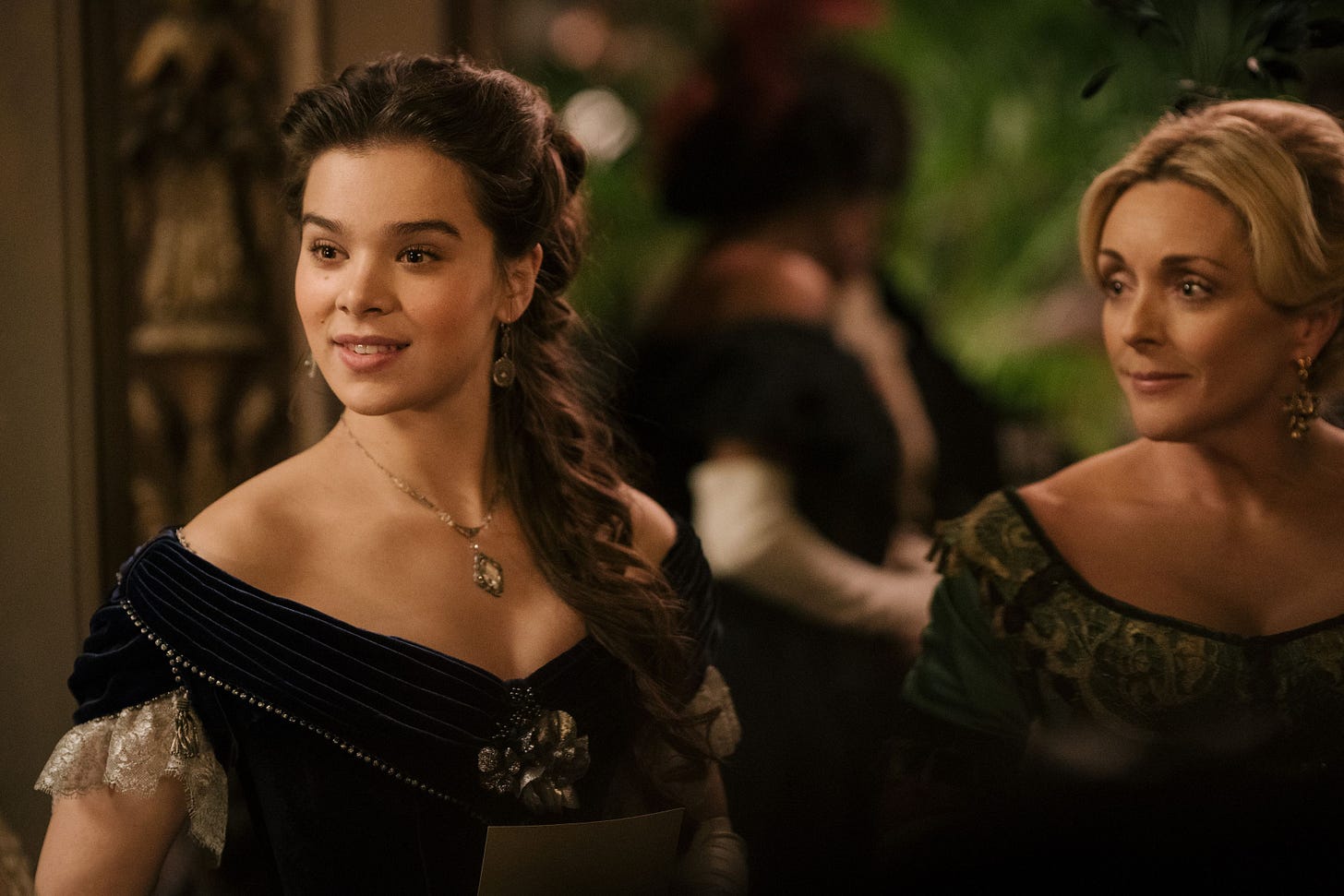The Yellow Rose of Amherst
A personal truth, which I am somewhat ashamed to admit, given that I am a writer: I do not like poetry.
The word “like” doesn’t convey all of my thoughts re: poetry. Mostly, I just don’t want to take the time to understand it, to sit with a poem and unpack all of its subtle meanings and shadings and import. Give to me a sentence, a paragraph, a page.1 Use conventional grammar. I will pull up a chair and give you a fair hearing. Random Capitals and —
Oddly placed m-dashes? I’m out.2
Which is why when a good friend suggested I watch Dickinson on Apple+3, I outwardly said, “I’ll check it out,” knowing full well that I intended to check it out because I trusted the friend but that I likely would not check it out because I could not care less about Emily Dickinson,4 on whose life the show is based. In my mind, her poems go hand-in-hand with being forced the read The Scarlett Letter in high school, which is one of the few assigned readings I never finished. In my mind, most American writing before Mark Twain is just dour and slow.5
Another truth: Dickinson is an absolute delight and not-at-all what I thought it was. As usual, presuming to assume made an “ass” out of “me.”6 What creator Alena Smith has built is a show that tells the truth of Dickinson’s work without worrying about the story being accurate. She tells it slant, like the poet might, using modern language and music7 — and by building a frame8 out of the few biographic details we have for this art to hang in.
The show’s contradictions are hard to capture in words — and, yes, I know that is why people write poetry — but I’ll give it a whirl: it is emotionally messy but intellectually concise. The actors (from the always great Jane Krakowski to Hailee Steinfeld and on down)9 make their work seem easy, which is very hard to do.10 Issues from the 1850s like race and epidemics seem simultaneously historic and very much alive. The costumes and sets are meticulously designed, yet seem to have always existed in this world. 11
That alone would be enough to keep me watching. But Smith and company add in historical tidbits that warm my nerdy little heart.12 There is a whole subplot involving belladonna eyedrops, which were trendy back in the day. Emily’s sister talks about courting rituals, including one about hair and men’s necks, and eagerly awaits Dickens’ next magazine installment. Tulip sleeves get their due, as do the “great men” of the day like Thoreau.
All of the above would have me irretrievably hooked. And yet, the ante keeps being upped by what these creators are saying about the fundamental nature of any art. “To write is to ask someone to listen,” Smith says here, and all writing is an effort to build a connection to another human being. I’d argue that you can apply that to any form, from dance to painting to, yes, poetry. Dickinson is about that universal truth, told with singular choices to make a unique whole.
Thank you for listening.
It has been suggested to me that the reasons I don’t dig poetry is because I am not adequately in touch with me deepest feelings. To which I say: maybe? And also: go fuck yourself?
now in its third and final season
Years ago — this is while I was pregnant with my younger child so at least 16 years ago — I drove up to Amherst, Mass., to see the Yarn Harlot give a talk. The B&B proprietress wanted to make arrangements for me to see the Emily Dickinson Museum. I visibly recoiled and she seemed insulted. In my defense, I was very pregnant and had just been assaulted by smells at the nearby Yankee Candle emporium. But I still feel sorta bad about my visible response to someone trying to be helpful.
I know this is a personal failing and is based solely on what is on high school reading lists. I have zero doubt that these are great early and mid-century books.
“u” remain blameless.
The soundtrack for all three seasons is one I’d snap up in a heartbeat. I’m sure some enterprising young has a spotify playlist or something.
The very best theatre comes from laying down hard ground rules, then letting your mind and body and voice go.
The one exception might be Wiz Khalifa, who is really more a persona than an actor. He’s very good at what he’s doing here but is over-matched. To be fair, I don’t know that Steinfeld is much of a rapper.
There is a scene near the end of season one where Steinfeld and Adrian Blake Enscoe have an argument in the family’s greenhouse that should be shown in acting classes. What is being said isn’t nearly as important as what these characters are feeling and you can read in the actors faces how the new terms of their relationship is freaking them out. It’s so good.
I can confirm that the wallpaper is dead-on for the period.
I spend some time in a simulacrum of the 1850s and am in love with cultural (and otherwise) ephemera of the time.





I'm a poetry liker but not all poetry. I co-facilitate a therapeutic intervention called Mindfulness Based Cognitive Therapy, and let me tell you there is nothing worse than mindfulness poetry. The group is manualized so I have to read/hear Mary Oliver a lot, who does not resonate with me at all, but I have definitely tried to swap in an Anne Sexton or Raymond Carver poem.
We just got Apple+ so we could watch Schmiggadoon and Ted Lasso, we had forgotten about Dickinson so we'll check it out.
I’m totally with you, sister! On poetry AND the show - I. Love. It!! And Louisa May Alcott’s appearances? - OMG